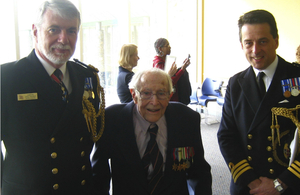Delaware resident receives Britain’s Arctic Star Medal
Wilmington man who braved ‘the worst journey in the world’ in the Second World War was honoured, 68 years after the combat ended.

Naval Attache, Cdre Eric Fraser, Lt Peter Andrews, and Assistant Naval Attache, Cdr Ian Atkins
For his service on the Arctic Convoys as a lieutenant in the Royal Navy, Peter Andrews received the Arctic Star medal at a special ceremony in Wilmington, Delaware on 15 April.
The Arctic Star recognises the service of Royal Navy and merchant sailors who delivered vital aid to Britain and America’s Soviet allies between 1941 and 1945. The crewmen of the convoys endured constant threat of attack by enemy submarines, aircraft and surface ships as well as atrocious polar weather conditions. If ships were sunk, sailors perished in minutes in freezing waters. Of the many who served in the Arctic Convoys, it is thought that between 200 and 400 sailors, all now at least in their late 80s, are still alive.
Lt Andrews’ outstanding story began in October 1941 after graduating from the University of Cambridge with an engineering degree when he joined HMS Edinburgh while she was patrolling the northern waters as part of the Arctic Convoys. On 30 April 1942, on route from Murmansk to Iceland, HMS Edinburgh was torpedoed three times in attacks by German ships and sunk in the Barents Sea. Lt Andrews, with the other survivors, were taken to Russia by other ships in the convoy where he stayed for 6 weeks until he could be repatriated. Lt Andrews subsequently joined HMS Belfast and continued service as part of the Arctic Convoys. Lt Andrews was on HMS Belfast when it played an important role in the Battle of North Cape, assisting in the destruction of the German warship Scharnhorst. Then during Operation Overlord, Lt Andrews was on HMS Belfast which was part of the supporting armada, bombarding German positions off Gold Beach on D-Day.
“I am honoured to receive this award though I was just one among more than a hundred thousand who participated in the Arctic Convoys.” said Andrews.
A review of military decorations by former diplomat Sir John Holmes concluded that the participants in the Arctic Convoys and Bomber Command veterans had been treated ‘inconsistently’ with many of their counterparts.
Just recently, Prime Minister David Cameron met and awarded the Arctic Star to veterans of both the Arctic Convoys and of Bomber Command in recognition of their deeds which are widely recognised as helping Russia’s war effort and significantly shortening the Second World War. The Prime Minister said he was ‘sorry’ it had taken 70 years for the men to be thanked by their country, calling them ‘a group of heroes’.
The Arctic convoys were made up of vessels which travelled from Britain to northern Russia to resupply the Soviet Union during World War II. By May 1945, the Arctic route had claimed 104 merchant and 16 military vessels. Thousands of Allied seamen lost their lives.